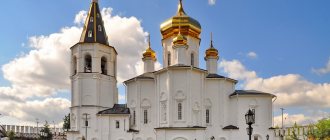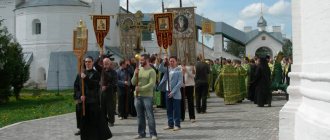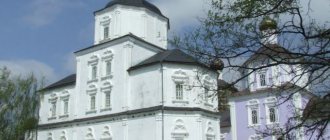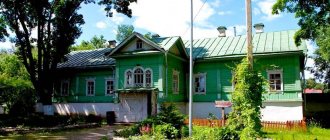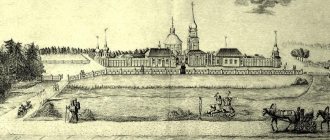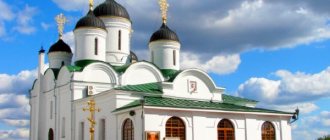Mir
Russia Moscow region Mozhaisk Luzhetsky monastery Map loading in progress...
{"format":"leaflet","minzoom":false,"maxzoom":false,"limit":50,"offset":0,"link":"all","sort":[""], "order":[],"headers":"show","mainlabel":"","intro":"","outro":"","searchlabel":"\u2026 \u0441\u043b\u0435\ u0434\u0443\u044e\u0449\u0438\u0435 \u0440\u0435\u0437\u0443\u043b\u044c\u0442\u0430\u0442\u044b","default":"","import-annotation":false,"width ":"auto","height":"350px","centre":{"text":"","title":"""link":"""lat":55.5211340000000035388438845984637737274169921875,"lon": 36.0073689999999970723365549929440021514892578125,"icon":""},"title":"","label":"","icon":"","lines":[],"polygons":[],"circles":[ ],"rectangles":[],"copycoords":false,"static":false,"zoom":8,"defzoom":14,"layers":["OpenStreetMap"],"image layers":[] ,"overlays":[],"resizable":false,"fullscreen":true,"scrollwheelzoom":true,"cluster":false,"clustermaxzoom":9,"clusterzoomonclick":true,"clustermaxradius":80, "clusterspiderfy":true,"geojson":"","clicktarget":"","showtitle":true,"hidenamespace":false,"template":"","userparam":"","activeicon": "","pagelabel":false,"ajaxcoordproperty":"","ajaxquery":"","locations":[{"text":"\u003Cb\u003E\u003Ca href=\"/palomnik/%D0% 9B%D1%83%D0%B6%D0%B5%D1%86%D0%BA%D0%B8%D0%B9_%D0%BC%D0%BE%D0%BD%D0%B0%D1%81% D1%82%D1%8B%D1%80%D1%8C\" title=\"\u041b\u0443\u0436\u0435\u0446\u043a\u0438\u0439\u043c\u043e\u043d\u0430\u0441\u0442\ u044b\u0440\u044c\»\u003E\u041b\u0443\u0436\u0435\u0446\u043a\u0438\u0439 \u043c\u043e\u043d\u0430\u0441\u0442\u044b\u0440\u 044c\u003C/a\u003E\ u003C/b\u003E\u003Chr /\u003E\u003Ca href=\"/palomnik/%D0%A1%D0%B2%D0%BE%D0%B9%D1%81%D1%82%D0%B2%D0% BE:%D0%90%D0%BD%D0%BD%D0%BE%D1%82%D0%B0%D1%86%D0%B8%D1%8F\» title=\»\u0421\u0432\u043e \u0439\u0441\u0442\u0432\u043e:\u0410\u043d\u043d\u043e\u0442\u0430\u0446\u0438\u044f\»\u003E\u0410\u043d\u043d\u043e\u0442 \u0430\u0446\u0438\ u044f\u003C/a\u003E: \u043f\u0440\u0430\u0432\u043e\u0441\u043b\u0430\u0432\u043d\u044b\u0439 \u043c\u0443\u0436\u0441\u043a \u043e\u0439 \u043c\u043e \u043d\u0430\u0441\u0442\u044b\u0440\u044c. \u0420\u0430\u0441\u043f\u043e\u043b\u043e\u0436\u0435\u043d \u0432 \u0433\u043e\u0440\u043e\u0434\u0435 \u041c\u043e\u0436 \u0430\u0439\u0441\u043a\u0435 . \u0415\u0434\u0438\u043d\u0441\u0442\u0432\u0435\u043d\u043d\u044b\u0439 (\u043a\u0440\u043e\u043c\u0435 \u0445\u0440\u0430\ u043c\u043e\u0432\u043e\ u0433\u043e \u043a\u043e\u043c\u043f\u043b\u0435\u043a\u0441\u0430 \u043d\u0430 \u043c\u0435\u0441\u0442\u0435 \u0431\u044b\ u0432\u0448\u0435\u0433\u043e\ u042f\u043a\u0438\u043c\u0430\u043d\u0441\u043a\u043e\u0433\u043e \u043c\u043e\u043d\u0430\u0441\u0442\u044b\u0440\u044f) \u 0438\u0437 18\u0441\u0440\ u0435\u0434\u043d\u0435\u0432\u0435\u043a\u043e\u0432\u044b\u0445 \u043c\u043e\u043d\u0430\u0441\u0442\u044b\u0440\u0435\u04 39\u041c\u043e\u0436\u0430\ u0439\u0441\u043a\u0430, \u0441\u043e\u0445\u0440\u0430\u043d\u0438\u0432\u0448\u0438\u0439\u0441\u044f \u0434\u043e \u043d\ u0430\u0448\u0438\u0445\u0434 \u043d\u0435\u0439.","title":"\u041b\u0443\u0436\u0435\u0446\u043a\u0438\u0439 \u043c\u043e\u043d\u0430\u0441\u0442\u044b\u0440\ u044c", "link":"","lat":55.5211340000000035388438845984637737274169921875,"lon":36.0073689999999970723365549929440021514892578125,"icon":""}], "imageLayers":[]}
55.521134; 36.007369
Russia, Moscow region, Mozhaisk, Gerasimova street, 1
Mozhaisk, Moscow region 143200
Russia
Telephone:
8 (496) 38 40 673
Email:
Mozhaisk Luzhetsky Nativity of the Virgin Mary Monastery
- Orthodox male monastery. Located in the city of Mozhaisk, it has existed since the 15th century. The only one (except for the temple complex on the site of the former Yakimansky monastery) of the 18 medieval monasteries of Mozhaisk that has survived to this day.
History[edit]
St. Ferapont Belozersky
The monastery was founded by St. Ferapont Belozersky, a student of Sergius of Radonezh at the request of Prince Andrei of Mozhaisky. This happened in 1408, 11 years after he founded the Belozersky Ferapont Monastery.
The dedication of the Luzhetsky Monastery to the Nativity of the Blessed Virgin Mary is associated with the decision of Ferapont himself. Apparently the Nativity of the Mother of God was close to his soul, since the Belozersky Monastery was also dedicated to the Nativity. In addition, this holiday was especially honored by Prince Andrei. It was on this holiday in 1380 that his father, the Grand Duke of Moscow Dmitry Ioanovich, fought on the Kulikovo field. According to legend, in memory of that battle, his mother, Grand Duchess Evdokia, built the Church of the Nativity of the Virgin Mary in the Moscow Kremlin.
The first stone cathedral in honor of the Nativity of the Virgin Mary stood in the Luzhetsky Monastery until the beginning of the 16th century, after which it was dismantled, and in its place, in 1524-1547, a new, five-domed one was built, which has survived to this day.
The first archimandrite of the Luzhetsky monastery, the Monk Ferapont, having lived ninety-five years, died in 1426 and was buried near the northern wall of the cathedral. In 1547 he was canonized as a saint of the Russian Orthodox Church. Later, a temple was built over his burial.
In 1918, soldiers of the guard company were stationed in the cell building. In 1922, the monastery was officially closed. In 1926, the library, archives and sacristy were transferred to the Karelian Museum. Until the end of 1929, the cathedral was opened as a parish cathedral. On November 11, 1929, according to the protocol of the Moscow Regional Executive Committee and the Moscow City Council, the temple was closed.
The monastery survived the opening of the relics of the founder, devastation, destruction and desolation (it stood ownerless in the mid-1980s). In the pre-war period, the monastery housed a furniture factory and a workshop for a medical equipment plant. At the monastery necropolis there were factory garages with inspection pits and warehouses. Communal apartments were set up in the fraternal cells, and the buildings were transferred for the establishment of a canteen and a club for the military unit.
In 1994, the monastery was again transferred to the church. On October 23, the first bishop's service after the break took place. And on May 26, 1999, with the blessing of Metropolitan Juvenaly of Krutitsy and Kolomna, the relics of St. Ferapont were found. Now they rest in the Cathedral of the Nativity of the Blessed Virgin Mary.
In April 2015, a new bell weighing more than 2.5 tons was installed on the bell tower. The blagovest depicts icons of especially revered Russian saints - the Savior, the Mother of God, Nicholas the Wonderworker, Ferapont of Mozhaisk.
On August 9, 2015, after a 10-month reconstruction, the opening of the bell tower took place, under which is the tomb of the Savelov family.
Schedule of services and requirements
Divine services in the Mozhaisk Luzhetsky Ferapontov Monastery are held every day. Parishioners can attend morning prayers, which begin at six in the morning on weekdays and on Saturdays, and at eight in the morning on Sundays and holidays. Every Saturday after the Divine Liturgy, held at nine in the morning, memorial services are held for the departed.
Schedule of services on the official website of the Luzhetsky Monastery
Those who wish can order requests for health, repose, memorial services and prayer services. To do this, it is not necessary to visit the monastery; you can submit notes by email to the monastery. Detailed information on how to submit a note is available on the monastery’s official website.
The road from the monastery to the well of St. Ferapont, © Margarita Kushnirenko
Current state[edit]
Traditions, maintained over previous centuries and seemingly forgotten in the godless decades of the 20th century, began to be resumed under Abbot Boris (Petrukhin), appointed rector of the Luzhetsk monastery in 1994.
This worthy shepherd gave a lot of both physical and mental strength to the monastery. From a “state-protected” architectural monument, as the monastery was perceived by the Mozhaisk residents, it again became a place of prayer. The revival of the monastic monastery entailed the revival of human souls, their cleansing from sin and vice.
When and by whom was it founded?
Many ancient chronicles tell about how the Luzhetsky Monastery in Mozhaisk developed (its photos are presented on the page). The first stones of this interesting complex were laid in 1408. The founder of the monastery was Ferapont Belozersky, a student of Sergius of Radonezh.
By the time the Luzhetsky Monastery was built, the elder was already 70 years old. This monastery was founded at the request of Prince Andrei Mozhaisky.
How to get there[edit]
Address:
Russia, Moscow region, Mozhaisk, st. S. Gerasimova, 1
You can get to the monastery from Moscow from the Belorussky railway station - by train to the Mozhaisk station.
Or by intercity bus, which departs from the Belorusskaya Koltsevaya metro station (Gruzinsky Lane, 3). The final stop of the bus is the bus station in Mozhaisk. From the center of Mozhaisk to the monastery you need to take a city bus to the “Moscow River” stop.
If you travel by car from Moscow, it is most convenient to follow the Minsk Highway until the turn to Mozhaisk. Next you need to drive through the entire city, first along Kommunisticheskaya Street, then turn left onto Moskovskaya and immediately turn right onto Klementyevskaya. When following Klementyevskaya Street, do not miss the sign to the monastery (to the left).
Brief biography of Father Ferapont
This Orthodox saint was born near Volokolamsk in 1337. His parents were of a boyar family. In the world, the future founder of the Luzhetsky Monastery was called Fyodor Poskochin. The saint decided to become a monk already in adulthood. He took monastic vows at the Moscow Simonov Monastery. He was blessed by the then abbot of the monastery, Father Feodor, who was the nephew of Sergius of Radonezh. Presumably he was tonsured a saint in 1385.
In the Simonov Monastery of St. Ferapont became friends with another righteous monk, Father Kirill. Together they founded a monastery on the shores of Beloozero. According to legend, the Mother of God herself indicated the site for the construction of the new monastery to Father Cyril. The Belozersky Monastery was founded by the monks in 1398. It was in this monastery that Father Ferapont spent the next ten years of his life, until he was invited by Prince Andrei to found a new monastery.
Luzhetsky Monastery in the Time of Troubles
During the Lithuanian invasion of 1605-1619. the monastery was seriously damaged. All churches were completely destroyed. The disaster was so serious that for another 7 years after this, services were held only in the Cathedral. From this largest church in the complex, as well as from all the others, the Lithuanians removed a huge number of icon frames, sacred vessels and other valuable church utensils. Fortunately, Father Ferapont’s coffin remained intact at that time. The monastery was restored in subsequent years mainly through donations.
Creation of a new ensemble
Today the Luzhetsky Monastery complex (Mozhaisk) includes, of course, many more buildings than there were under Father Ferapont. The creation of the current ensemble of the monastery began in 1523 on the initiative of the then archimandrite Father Macarius of Moscow. At the request of this priest, the Church of the Virgin Mary, which had stood for about a hundred years, was demolished. In its place a large five-domed Cathedral with a gallery was built. The temple was painted by masters from the school of Dionysius specially invited for this purpose. Unfortunately, only isolated fragments of those frescoes have survived to this day.
In 1692, with the support of Patriarch Joachim, a three-tier bell tower was built on the territory of the monastery. The main donors to the monastery at that time were representatives of the Savelyev family. Later they were buried on the first tier of this structure. Unfortunately, their tombstones, like the frescoes in the Cathedral, have not been preserved.
What kind of buildings the Luzhetsky Monastery consisted of (photos of the modern complex presented on the page clearly demonstrate its scale) in the past is not known for certain. But there is a charter according to which between 1569 and 1574 four royal children were sent to the monastery. This means that at least 4 churches operated on the territory of the monastery.
Necropolis of the monastery
Some tourists find the monks' cemetery, located on the territory of the monastery, quite unusual. It seems that the headstones do not belong to the graves at all. The fact is that many of them have non-Christian symbols stamped on them: swastikas and Kolovrat symbols. The same stones lie in the backyard. Once they were used as material for the construction of the monastery.
Perhaps in ancient times there was a pagan cemetery on this site. And not to go far, the first builders simply used strong tombstones to erect religious buildings of the new official religion. Of course, this is nothing more than a guess. However, pagan symbols (and on some stones even inscriptions in the ancient Slavic language) could not appear out of nowhere, of course.
Venerable Ferapont of Beloezersky, Mozhaisk, Luzhetsky
Kontakion 1
Following the chosen Voivode and the Lord Jesus, through prayer, fasting and the labors of carnal passion, you conquered: in the same way, as a good warrior, you were crowned by the King Christ, Who does not cease to pray warmly for us, your servants, reverend, so that by you, having been delivered from troubles, we will always sing to you :
Rejoice, Feraponte, servant of Christ and miracle worker.
Ikos 1
From your infancy and even to old age, you worked body and soul for the Lord Jesus Christ and His Most Pure Mother, and now your soul rejoices in His heavenly abodes, and your body, resting here, shines with miracles. For this reason we cry out to you joyfully:
Rejoice, you who walk steadily in the footsteps of Christ. Rejoice, you who keep His word firmly. Rejoice, you who labored for the glory of Christ God. Rejoice, ever-glorifying Most Pure Mother of Christ. Rejoice, glorified by Christ and His Mother. Rejoice, you who have great boldness towards Christ. Rejoice, protector of the Luzhetsky monastery. Rejoice, guardian of the country of Mozhaisk. Rejoice, strong champion for the Russian state. Rejoice, good-victorious warrior of the Orthodox Church. Rejoice, you who give quick help from Christ God to all who call on you. Rejoice, Feraponte, saint of Christ and miracle worker.
Kontakion 2
While you were in the rumors of life, you did not delight in the good things, you were saddened by the evil things of this world, but looking towards the honor of the highest calling, under the burden of worldly vanities you remembered to always sing to God: Alleluia.
Ikos 2
Diligently doing the works of your worldly service, reverend, you had one thing in your heart: so that you will not be condemned to appear at the terrible Judgment of the Lord of Glory, and now having piously prepared yourself for this, you hear from everyone:
Rejoice, your mind is fixed on heaven. Rejoice, you who have raised your eyes from the corruptible world to the imperishable. Rejoice, thou who loved spiritual poverty more than earthly goods. Rejoice, having found consolation for yourself in the sorrow of your sins. Rejoice, thou adorned with meekness. Rejoice, you who are hungry for righteousness before God. Rejoice, gracious to those who sin. Rejoice, compassionate warmth for the suffering. Rejoice, thou who art kindest to all. Rejoice, most beloved to all who lead you. Rejoice, you who generously gave alms. Rejoice, Feraponte, saint of Christ and miracle worker.
Kontakion 3
May it not be malice that changes your good mind; you secretly departed from your relatives to the holy monastery of blessed Theodore, and there, freedom from worldly vanities, sing to God: Alleluia.
Ikos 3
Blessed Theodore, taught about you by God, understood you, already experienced in fasting and prayer, joyfully received you into his monastery, and on the day of your coming to him, he clothed you in the monastic rite, with all his companions crying out to you:
Rejoice, you who despise all the red of the world. Rejoice, thou who art departed from the flattering world, like a bird from a snare. Rejoice, more to God than to man, who have chosen to work. Rejoice, having accepted monasticism for the sake of doing good to God. Rejoice, for you have already prepared yourself to be a skilled monk in the world. Rejoice, for you have offered everything to Christ as a pure sacrifice. Rejoice, for the sake of Christ, deny yourself. Rejoice, you who truly lifted up the Cross of Christ. Rejoice, you who have longed to be with Christ forever. Rejoice, loving Christ God with all your soul. Rejoice, beloved of Christ God. Rejoice, Feraponte, saint of Christ and miracle worker.
Kontakion 4
To the elder, to whom you were entrusted, as you worked for your father, confessing your sins to him every day, you drove away evil thoughts from yourself, for this reason you cried out to God with a pure heart: Alleluia.
Ikos 4
Having labored well through the feat of monasticism, you did not imagine that you had done good, but you imagined that you were indecent, and falling at the feet of your followers, you tearfully begged them to beg the Most Pure Mother of God to save you from hell fire. This is knowing, we cry out to you:
Rejoice, having cleansed your soul with tears of repentance. Rejoice, thou who have cast down the spirit of pride. Rejoice, having learned to see your sins. Rejoice, having not condemned a single one of those who have sinned. Rejoice, you who calmed controversy with brotherly love. Rejoice, you have been unwavering in your obedience to everyone. Rejoice, strengthened by the prayers of the brethren. Rejoice, you trusted not in yourself, but in the Most Pure Mother of God. Rejoice, blessed in all your labors by the Most Pure Mother of God. Rejoice, having acquired the Blessed Mother of Christ God as your intercessor. Rejoice, freed by Her from eternal torment. Rejoice, Feraponte, saint of Christ and miracle worker.
Kontakion 5
In the same monastery of blessed Theodore you had a friend, a faster and a prayer partner, the Venerable Cyril, equal to you; with him, taught by the Venerable Sergius, with one heart and one mouth, you incessantly sang to God: Alleluia.
Ikos 5
Your companions, having seen you, greatly advance in good monastic life, in humility and obedience, in chastity and brotherly love, glorifying God and the Most Pure One, who gave you such grace, but we, having realized this, cry out to you:
Rejoice, otherwise, the monks are praised. Rejoice, fellow saint of St. Cyril. Rejoice, faithful disciple of St. Sergius. Rejoice, you who have revealed the true image of chastity. Rejoice, having strengthened your heart through fasting. Rejoice, thou who hast blessed thy soul with vigil. Rejoice, fragrant to God through your prayers. Rejoice, guardian of angelic purity. Rejoice, imitator of cherubic thought of God. Rejoice, zealous seraphim for God's love. Rejoice, Feraponte, saint of Christ and miracle worker.
Kontakion 6
Walking around the country of Beloezersk, you found many places, red and comfortable, where you could dwell in ultimate silence. And you longed for this silence, and in it you secretly called to God: Alleluia.
Ikos 6
At the voice of the Most Pure One, you came to the country of Beloezersk with your friend, the Monk Cyril, and you created a silent cell not far from him in the wilds, and in it you secretly aggravated your labors before God. Having taken me away, we cry out to you:
Rejoice, for God's sake you have longed for the quietest silence. Rejoice, brought into the wilderness by the dispensation of the Most Pure One with your friend. Rejoice, sharing the silence of the desert with your only friend. Rejoice, even if you were separated from this friend, so that you may be one with Christ. Rejoice, you who rejoice in the desert cell more than in the palace. Rejoice, you spend your days in work and spend your nights in vigil. Rejoice, for the sake of Christ you strive from hardest to hardest labor. Rejoice, having achieved the secret work before the Heavenly Father. Rejoice, having filled the desert wilds with your prayerful voice. Rejoice, never silently glorifying the name of Christ with your lips. Rejoice, having the Sweetest Jesus in your mind and heart. Rejoice, Feraponte, saint of Christ and miracle worker.
Kontakion 7
You have put to shame the robbers with rage through poverty and patience, you have conquered the night birds of the clique and the vacillation of animals through faith in Christ, and you have crushed to the end the tireless labors of the lusts and infirmities of the flesh, silently crying out to God: Alleluia.
Ikos 7
Far away, your godly life was heard, reverend. And from the end of the Russian land flowed to you who love silence. Receive these with love, just as a father rejoiced at the conversion of his erring children. In the same way we cry out to you:
Rejoice, imitator of the ancient desert fathers. Rejoice, you who patiently bore the heat, cold and famine in the desert. Rejoice, conquering the burden of the day and the fear of the night through love for Christ. Rejoice, fearless neither of wild beasts nor of evil men. Rejoice, thou kindest to the destroyer of the temptations of the devil. Rejoice, for your secret exploits in the desert you were glorified by God in reality. Rejoice, for even in the desert the Lord made you a leader seeking salvation. Rejoice, thou who hast beautified the desert with the abode of the monastic. Rejoice, kind leader of unskilled monks to Christ. Rejoice, having sanctified the desert by building the temple of God. Rejoice, you who sang joyfully to God in the temple with your disciples. Rejoice, Feraponte, saint of Christ and miracle worker.
Kontakion 8
Hearing about you and your companions, Reverend, the blessed Prince Andrei with all his heart praised God, who blessed his fatherland with such inhabitants, and sang joyfully to God: Alleluia.
Ikos 8
The noble Prince Andrey desired to receive a blessing from your shrine, reverend, and invite you to your city, but you, obeying the prayer of him and the brethren, despising the years of old age and the labor of the distant journey, soon came to the prince and heard from him:
Rejoice, O years, most adorned with wisdom. Rejoice, unchanging ascetic of Christ. Rejoice, filled with the Holy Spirit. Rejoice, beloved Mother of God. Rejoice, having created an abode of monks in Her name. Rejoice, true image of your flock. Rejoice, child-loving father of monks. Rejoice, your beloved monks, like a most loving father. Rejoice, fill all those who come to you with joy. Rejoice, give quick consolation to everyone. Rejoice, planter of love and peace. Rejoice, Feraponte, saint of Christ and miracle worker.
Kontakion 9
The blessed Prince Andrey rejoiced with joy when he saw your coming to him and, so that he would not be separated from you, he begged you to create a new monastery for monks near him, in which he would sing to God: Alleluia.
Ikos 9
Even though you strongly denied, not just the prince, but obeying God Himself, in the red place near the city of Mozhaisk you created the Most Pure Church and a new monastery for monks, of which you yourself were a mentor until the end of your days, and you also hear from everyone:
Rejoice, thou who fulfilled the good wishes of the noble prince wisely. Rejoice, founder of your second monastery of monks in the name of the Mother of God. Rejoice, you who have gathered to this monastery many people who are being saved. Rejoice, planter of a good life in her. Rejoice, having nourished me with your instructions. Rejoice, thou who grew by thy many tears. Rejoice, for you have adorned you with many works and good deeds. Rejoice, for through your prayers you have created the pure bride of Christ. Rejoice, having joyfully given up your pure soul to Christ. Rejoice, may your body remain forever in this monastery of yours. Rejoice, from it shine forth the world's miracles. Rejoice, Feraponte, saint of Christ and miracle worker.
Kontakion 10
Your pure soul, reverend one, having strengthened your talents with many deeds and sorrows, brought it to God who gave me, and entered into the joy of your Lord, now crying out to Him joyfully: Alleluia.
Ikos 10
Even until the end of your days you did not cease to desire your return to your first monastery, Beloezersk, but you flowed to the first and most desired heavenly monastery, and left your holy body, for the protection and protection of your second monastery, Luzhetsky, for whose preservation we call you:
Rejoice, living on earth like an angel. Rejoice, rejoicing in heaven with the angels. Rejoice, thou art united in heaven with all the saints. Rejoice, glorified on earth for miracles. Rejoice, faithful guardian of the monastery, in which your body rests. Rejoice, deliver this monastery from destruction. Rejoice, you humbled the enemies of foreigners in it. Rejoice, overthrow all her visible and invisible enemies. Rejoice, drive away all misfortunes from her. Rejoice, give us through your prayers everything we need for eternal life. Rejoice, destroyer of enmity and planter of brotherly love. Rejoice, Feraponte, saint of Christ and miracle worker.
Kontakion 11
You were an image to your flock in everything and you appeared to all who came with you to Christ along the narrow path, a leader to eternal glory, in which now you cry out to God with all the saints: Alleluia.
Ikos 11
Our singing to you is overcome by the abundance and greatness of your deeds and all your virtues and miracles. Both burning with love for you, unable to remain silent, we pray: accept from us great, even meager, praise:
Rejoice, image of humility, meekness and obedience. Rejoice, praise be given to those who are virgins. Rejoice, our helper in spiritual struggles and physical labors. Rejoice, heal us from passions. Rejoice, quick doctor in sickness and illness. Rejoice, intercessor of the orphans and all the offended. Rejoice, our comforter in sorrows and troubles and all kinds of misfortunes. Rejoice, deliver us from fire and drowning. Rejoice, our nourisher in days of famine and poverty. Rejoice, give us an abundance of fruits and the goodness of the air. Rejoice, for you have made God merciful to all of us through your petitions to Him. Rejoice, Feraponte, saint of Christ and miracle worker.
Kontakion 12
Singing your life according to God, your monastic image, and thanking all your help, reverend, we glorify those who glorified you, God and the Most Pure Mother of God, and cry to them with you: Alleluia.
Ikos 12
The Preacher of Orthodoxy appeared, O Reverend, to your city and the surrounding country, and far from them, with your prayers, you abolished all the lying teachings of flattering and crafty people, but you and I are confirmed in the right faith by crying out to you:
Rejoice, rule of faith in Christ. Rejoice, true image of love for God. Rejoice, vigilant shepherd of the flock of Christ. Rejoice, accuser of wickedness. Rejoice, destroyer of the evil-believers. Rejoice, affirmation of the faithful. Rejoice, protector of all Orthodox Christians. Rejoice, grant speedy correction to all who err. Rejoice, dispel the darkness of unbelief. Rejoice, lead everyone to Christ God. Rejoice, Feraponte, saint of Christ and miracle worker.
Kontakion 13
O most blessed and most wonderful Father Feraponte! Deliver us all, who are now earnestly praying to you, from troubles and eternal torment, through your prayers pleasing to God, and let us sing with you to God: Alleluia.
This kontakion is read three times, then the 1st ikos and the 1st kontakion.
Prayer to St. Ferapont of Mozhaisk, Luzhetsk Wonderworker
O all-honorable and blessed our father, Feraponte! You have been given the grace to pray for us, and we know, as we stand before the Throne of the Lord, you always show your love for us by your unceasing intercessions for us. But since we are constantly multiplying our sins, we have become worthy of your extreme disgust; for this reason, in repentance, with falling tears, we pray to you: do not exchange your mercy towards us for anger for our wickedness and filthiness, show us your mercy to the end and those who sin against us cleanse with your prayers, lead to repentance, strengthen for good deeds, preserve in Orthodoxy and in all sacred things. Grant us to abide in peace, silence and brotherly love, ask us for times of serenity and an abundance of earthly fruits, deliver us from fire and from drowning and from severe diseases and deadly ulcers. Bring good success to the toilers, a stumbling-free path to those who travel, a quiet refuge to those floating in the sea, freedom and relief to the captives, help and intercession to the orphans. Pray to God: may the Lord free the suffering Russian country from the cruel atheists and their power, and may He erect the throne of Orthodox rulers; may His faithful servants, in grief and sorrow cry out to Him day and night, hear the pained cry and bring our belly from destruction; May we always sing thanksgiving to your protection of love, to the Lord Jesus Christ, who glorified you, to Him belongs all glory and honor, with His Beginning Father and with His Most Holy and Life-Giving Spirit forever and ever. Amen.
Spring
Another attraction of the monastery is the well with holy water. It is not located on the territory of the monastery, but in the nearby village of Isavitsy. It is believed that this well was dug by Elder Ferapont himself.
The area around the spring is landscaped - there are benches and baths. A monument to Father Ferapont was also erected here. There is also a chapel and a church shop in the village. To get to the well, you need to stand in line. There are many people who want to collect holy water from the Ferapont spring.
Monastery under the French
The Luzhetsky Monastery suffered another disaster during the war with Napoleon. The French who captured Mozhaisk placed the Westphalian corps of General Junot in the monastery. As a result, the monastery was turned into a kind of carpentry shop.
Like the Lithuanians, the French stole many expensive items of church utensils from churches and the Cathedral. However, fortunately, this time the invaders did not cause much damage to the monastery. For example, the Church of St. Feraponta was completely ready for consecration within a month after the brethren returned to the monastery.
During the years of Soviet power
Like all other monasteries in the country, during the years of communist rule the Luzhetsky Monastery experienced far from the best times. In 1929 it was closed. Some of the brethren were dispersed, the other part were repressed. Before the Second World War, there was a workshop for the production of medical equipment in the monastery. Above the necropolis, the authorities built garages and warehouses with inspection pits. Then for a long time the monastery stood completely ownerless.
Brief biography of Prince Andrei
The Russian ruler, by whose decree the Ferapontov Luzhetsky Mozhaisk Monastery was built, was the third son of Dmitry Donskoy. He became Prince of Mozhaisk in 1389. These lands were bequeathed to him at the age of seven by his dying father. In addition to Mozhaisk, his possessions included such cities as Kaluga, Iskona, Galichichi and Beloozero, where Father Ferapont lived for a long time.
The idea of building a monastery came to Prince Andrei for a very simple reason. The fact is that in the vicinity of the main city of his lands there were no large monasteries dedicated to the Nativity of the Blessed Virgin Mary. After the construction of the monastery, this ruler helped its archimandrite in every possible way. Prince Andrei Mozhaisky died six years after the death of Father Ferapont - in 1432.
